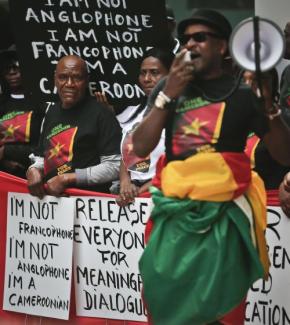Results of African division
Difficult legacy

In 1884, Chancellor Otto von Bismarck of Germany convened the Berlin Conference to coordinate the rush for territory in Africa by European nations. The idea was to organise the division of the continent among the main conquering powers. The key decisions made at that conference had long-lasting impacts on the political, social and economic trajectories of most African nations.
The fact that a territory was entrusted to one or another colonial power determined the model of governance and the legal system that were adopted. It also defined societies’ frameworks in economic and cultural life. The differences between the models made African unification very difficult, if not impossible.
Location names such as Victoria Falls or Lake Albert, clothing habits such as judges’ wigs in former British colonies or currency denomination (CFA Franc, Congolese Franc et cetera) are just a few examples of the strong influence that colonialism still has today. This influence and its consequences manifest themselves in various ways, affecting politics, the law, culture and the economy of different African nations.
Traditional distinctions ignored
Politically, the borders that were agreed at the Berlin Conference re-configured the continent for geopolitical purposes. The borders were imposed upon Africa without taking into account the history and dynamics between the peoples concerned. Ethno-linguistic groups who shared a common cultural and historical background were split. The Kongo people, for instance, came under the rule of three different colonial powers: Belgium in the Democratic Republic of the Congo, France in the Republic of the Congo and Portugal in Angola. The distinct legal and social systems of the European powers often did not correspond to the needs, habits and customs of the administered people.
The ongoing tensions in Cameroon are an example of that legacy (see my comment in D+C/E+Z e-Paper 2017/04, p. 13). The groups in the northwest and the southeast of the country are culturally similar, but were split during the colonial period into Anglophones (under British rule) and Francophones (under French rule). This division is proving to be a source of serious conflict today.
On the other hand, tribes which formerly constituted very distinct ethnic and political groups, such as the Hausa-Fulani, the Ibos and the Yoruba in Nigeria, were forced to cohabitate under the same colonial administration (the British empire). Moreover, the modes of government used by different colonial powers exacerbated divisions among African nations.
Belgium, France and to some extent Germany imposed direct rule. Their system of government was highly centralised. African political institutions and legal frameworks were completely replaced by colonial structures. The aim was to “assimilate” or “civilise” the societies concerned. This mode of government took away the authority from local leaders and placed it solely in the hands of the colonial powers, with colonial administrators running the key institutions.
This system was facilitated by the legal system based on the Civil Law system, in which the law is defined in a code that provides a set of rules and principles to be applied and respected by the administered peoples. The history of direct rule can, to a certain extent, explain governance issues that continue to plague most of the former Belgian and French colonies today. The authorities that took over from the colonial powers lacked experience and had little time to prepare for office. All too often, they stuck to the colonial model of wielding power.
Indirect rule, on the other hand, was a more cooperative mode of government, in which local African leaders were integrated into the colonial administration. The idea was to smoothen the imposition of foreign rule and ensuring its acceptance. This system, which was mostly used in British colonies, allowed some parts of the pre-existing political institutions and frameworks to remain. However, colonial administrators occupied the key roles, served the highest government posts and had the last say.
The corresponding legal systems were based on statutes emanating from English Common Law, but it accommodated different aspects of local traditions and cultures. The use of indirect rule facilitated a somewhat more effective and balanced governance in the former British colonies after independence. The reasons were the stronger involvement of indigenous people in public affairs and the impact their local traditions and cultures had had on the respective colony’s political and legal system.
Divide and rule
The colonial powers tended to adopt “divide and rule” policies, however. They accentuated the ethnic tensions the arbitrarily drawn borders had caused. They played off administrated groups against one another and certainly did not want them to develop a shared identity. Accordingly, pre-existing political institutions were weakened, allowing the colonisers to impose their rule more easily. A long-term consequence of this strategy is that nation-building efforts proved very difficult in countries such as the DR Congo (a former Belgian colony), Kenya and Nigeria (former British colonies) or Cameroon and Chad. All too often, ethnicity still takes precedence over common national identity.
In addition to the political and legal systems, education was key to redesigning the African societies during colonialism. Traditional African educational methods were replaced by systems that more or less copied the models used in Portugal, Spain, France, Belgium, Italy and Britain and used the colonial powers’ languages. However, the colonial administrations did little to promote basic education for the vast majority of the people. The result was a social division: a small class of local elites – mainly in urban areas – got a European style education. They were taught European history, laws and values. They were pitted against the vast majority of their compatriots, who lived mainly in rural areas and hardly had access to the colonial administrations.
The consequences of this split are still evident today, especially in view of increasing inequality. Social disparities are growing. African countries today have small but immensely rich elites and masses of people languishing in extreme poverty.
Even today, African countries have ties to the former colonial powers that tend to be stronger than the ties to neighbouring countries. The Commonwealth, the Afro-French relationship, the Congo-Belgium partnership still matter very much. After independence, most African countries retained the economic ties that were established by the European powers. They are still commodity-exporting economies, that import manufactured products, mainly from Europe and increasingly from Asia. The lack of diversification and specialisation makes them vulnerable to volatile commodity prices and dependent on aid, including the partnership agreements with the former colonial powers.
For three main reasons, the political, cultural and economic systems and alliances established through colonialism impede efforts towards regional integration in Africa today:
- the emphasis on ethnicity and the strong ties that bind national elites to the former colonial powers make national cohesion difficult and continental unity close to impossible;
- the commodity-exporting economies have little scope for trading among one another; and
- weak and vulnerable statehood make countries aid-dependent.
The picture of post-colonial Africa is gloomy. Africans themselves must rise to the challenges and come up with solutions to overcome the hurdles left by colonial rule. They must reform their current political, legal and economic systems by building and developing institutions, laws and values that fit their particular circumstances. Rather than relying to a great extent on technical and financial assistance from former colonial powers and international financial institutions, African states should focus more on effective nation-building as well as regional cooperation and common efforts towards economic transformation and self-reliance.
Jonathan Bashi works as a law professor and consultant in international development in the Democratic Republic of the Congo.













